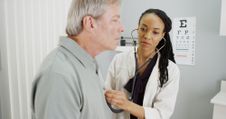
More than 200,000 people have been diagnosed with lung cancer this year. To raise awareness for the disease, November is designated as National Lung Cancer month. With so many people impacted by this cancer, it’s important to recognize the symptoms and treatment, as early detection is the key to maintaining your health at its best. If you or someone you love was recently diagnosed with lung cancer, below are the answers to the top four frequently-asked questions.
Your Guide to Lung Cancer
What is lung cancer?
Lung cancer begins in the lungs as either small cell or non-small cell cancers, both developed in heavy smokers. Small cell lung cancer is aggressive and it starts in the breathing tubes and metastasizes quickly throughout the body. Non-small cell cancer accounts for 80-85% of lung cancer cases and it starts with abnormal cells, which later form tumors in the lungs.
Who is at risk?
 Lung cancer mainly impacts smokers over 65 years old. Exposure to a variety of conditions, such as second-hand smoke, radon, and chest therapy radiation, can develop lung cancer. Additionally, those with a family history of lung cancer are at risk of developing the disease as well. Men are more likely to develop lung cancer than women, with one in 14 men developing the disease compared to one in 17 women.
Lung cancer mainly impacts smokers over 65 years old. Exposure to a variety of conditions, such as second-hand smoke, radon, and chest therapy radiation, can develop lung cancer. Additionally, those with a family history of lung cancer are at risk of developing the disease as well. Men are more likely to develop lung cancer than women, with one in 14 men developing the disease compared to one in 17 women.
What are the common symptoms?
Excessive coughing accompanied by blood, chest pain or pressure, wheezing, and weight loss are the most common symptoms of lung cancer. As the disease progresses, there may be difficulty in breathing, shortness of breath, fatigue, hoarseness, and frequent respiratory infections. If you or a loved one exhibit these symptoms, screening and early detection is the key to beginning the treatment process. Evaluation for lung cancer is non-invasive and simply involves a low-dose CT scan of the torso.
Are there any treatments?
Once diagnosed with lung cancer, additional tests will be ordered to determine the stage of your condition. Treatments can vary based on your symptoms and how advanced the cancer is. Treatment ranges from surgery and chemotherapy to radiation and targeted therapy. Surgery involves a procedure to cut out the cancerous cells, while chemotherapy and targeted therapy rely on medications to kill abnormal cells. Radiation therapy utilizes high energy rays to kill the cancerous cells.
For expert cancer care and treatment, trust the team at Alaska Oncology and Hematology, LLC, in the Greater Anchorage, AK, area. Whether your loved one is diagnosed with lung cancer or is seeking treatment in a warm and welcoming environment, the practice offers resources, guidance, and optimal health services. To talk to an experienced physician at the practice about National Lung Cancer Awareness Month and to learn more about how you can reduce your risk, call (907) 279-3155. For a list of treatments provided by this facility, visit their website.
About the Business
Have a question? Ask the experts!
Send your question

